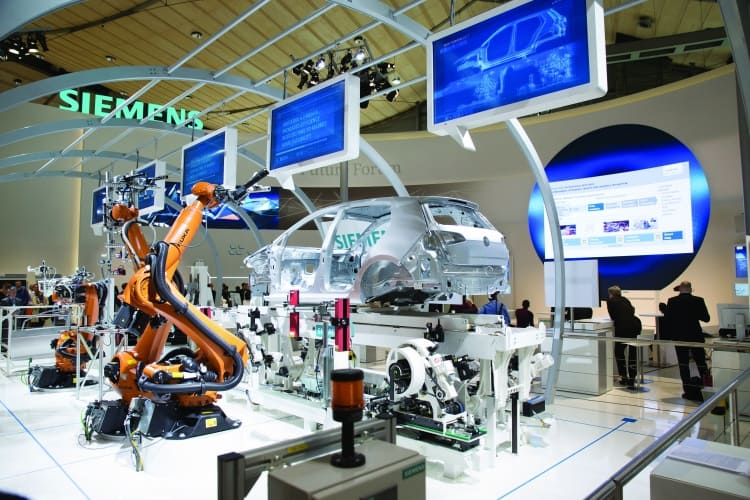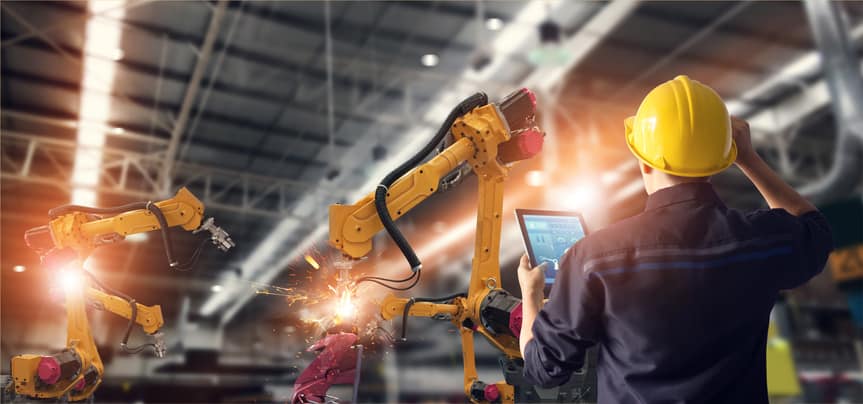A costly divorce. A chocolate orange. A cake. A cliff edge. These are just a few of the metaphors that have been used to make sense of what is happening in the UK’s departure from the European Union.
Whatever people choose to refer to it as, we can all agree that Brexit is complicated, and, as we have seen from the negotiating process, time consuming, taking up the majority of discussions regarding business, policymaking and daily life. The all-encompassing nature of Brexit however, means that other issues pressing to the current and future UK economy, such as the advancement of UK industry into the 4th Industrial Revolution (4IR) which is rapidly gaining momentum elsewhere, are falling by the wayside.

The primary benefit of the technologies of the 4th Industrial Revolution to UK industry is that they can help to improve productivity in firms, an issue that is of utmost importance given the stagnating performance of UK productivity over the past decade. Many manufacturers have been engaging in the technological advancements associated with 4IR for quite some time, although often not under the label of 4IR, as a means of engaging in business improvements through technology.
Many aspects of 4IR can even offer a lifeline to mitigate concerns brought about by Brexit
However, despite initiatives in the past few years, such as the government’s Made Smarter review and subsequent funding programmes to increase the adoption of Industrial Digital Technologies within manufacturing, the UK is still behind several international counterparts in metrics for adoption of, and readiness for, 4IR. The Economist’s 2018 Automation Readiness Index ranked the UK 8th, behind countries such as South Korea, Germany, and Singapore. The report noted the priorities of the Industrial Strategy and digital strategies such as AI and robotics R&D were a strong point for the UK, but also highlighted weaknesses in areas such as education policy and the need to support lifelong learning.
With Brexit taking up so much of UK policymaking time, it is important that the UK takes steps to improve adoption, and even aims to become a global leader of 4IR technologies and techniques, so as to raise productivity levels and avoid falling further behind competitors.
The truth is, there has never been a more important time for manufacturers to engage in the 4th Industrial Revolution. The UK economy is globalised in nature and there will be an inevitable shift in the way that our economy interacts with others. As such, it is vitally important to continue to improve all component parts of our economy, manufacturing being one of the most important, to ensure that it remains competitive post Brexit.

Many aspects of 4IR can even offer a lifeline to mitigate concerns brought about by Brexit. The manufacturing sector has been dealing with labour and skills shortages for some time now, and the potential loss of the EU workforce has the possibility to worsen this skills gap.
The technologies of 4IR, such as collaborative robots (cobots), automation and AI, can help to supplement existing workforces, allowing workers to work collaboratively with technology, particularly on repetitive and low skilled tasks, freeing up time to focus on the more knowledge based elements of their roles.
Information gained from sensors in the Internet of Things (IoT) can provide ‘big data’ allowing manufacturers to get further insight into what the most efficient equipment is, increase machine utilisation, and give full traceability to component parts and finished products. This allows manufacturers the possibility of improving their processes and supply chains, and the ability to keep their customers better informed.
Whatever metaphor is most apt for the ongoing development in Brexit, the UK has the opportunity now more than ever to take full advantage of the opportunities that 4IR offers. Rather than getting through the global race by focussing solely on trying to jump the Brexit shaped hurdle, it can find its way to the top of the group in 4IR and become the leader of the pack. Either that or a mix of other metaphors that represent a risk to global competitiveness in manufacturing, a continuation of flat-lining productivity levels and the chance of being left behind in the current industrial revolution after being a world leader in the previous three. It’s possible that if we get too distracted by the B word, after it’s all said and done, we may have missed an important opportunity to improve productivity and the economy.
Stephen Phipson is CEO of Make UK (formerly EEF)




IEA report claims batteries are ‘changing the game’
It is important in trucks and other commercial vehicles as the payload will be reduced if the battery weight is penal. Battery applications in the...